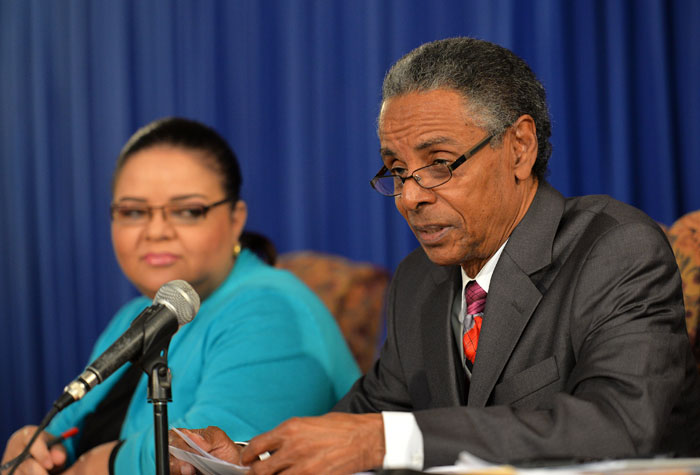Williams and Tufton are Still Members of the Senate – Attorney General
By: , February 13, 2015The Key Point:
The Facts
- In light of these rulings, the Attorney General has indicated that “I am of the opinion that Mr. Williams and Dr. Tufton still are members of the Senate and are entitled to take their seats.”
- The Attorney General conveyed his opinion during a special media briefing at Jamaica House on Thursday, February 12.
The Full Story
Attorney General, Hon. Patrick Atkinson, says that despite submitting letters of resignation, former Opposition Senators, Arthur Williams and Dr. Christopher Tufton, remain members of the Upper House, based on last week’s Supreme Court ruling.
Mr. Atkinson says his opinion is based on the Court’s judgment that the Leader of the Opposition’s request for and procurement of the pre-signed and undated letters of resignation and authorization, and the manner of their use to effect the resignation of the Senators, were “inconsistent with the Constitution, contrary to public policy, unlawful and is, accordingly, null and void.”
In light of these rulings, the Attorney General has indicated that “I am of the opinion that Mr. Williams and Dr. Tufton still are members of the Senate and are entitled to take their seats.”
The Attorney General conveyed his opinion during a special media briefing at Jamaica House on Thursday, February 12.
In relation to their replacements, Dr. Nigel Clarke and Ruel Reid, who were appointed in 2013, Mr. Atkinson said while the Court did not address their status, by virtue of its declaratory judgment in relation to Mr. Williams and, by extension, Dr. Tufton, “I am of the opinion that it has, by inference, ruled on the invalidity of the appointments.”
Mr. Atkinson pointed out that the judgment would also suggest that, from the outset, “no vacancy was created in the Senate.”
The Attorney General explained that Section 45 (1) of the Constitution outlines the circumstances under which replacements can be made in the Senate, by virtue of appointments by the Governor-General on the advice of either the Prime Minister or Leader of the Opposition, when a vacancy arises.
In arguing that the President of the Senate “does not have the authority” to make a determination regarding the appointments of Dr. Clarke and Mr. Reid, Mr. Atkinson contended that the matter “falls within the remit of the Court.”
Further, that a “very strong argument can be made” that their appointments “were not constitutionally or validly made.”
If court action is contemplated, the Attorney General pointed out that Section 44 (1) of the Constitution is “instructive” in determining the outcome where any person, who has been elected or appointed to the House of Representatives, or Senate, ceases to exercise his or her duties, as a member.
He said, in such a case, the Constitution stipulates that the matter “shall be determined by the Supreme Court or, on appeal, by the Court of Appeal, whose decision shall be final.”
“In these circumstances, either the affected parties should agree (on who will occupy the Senate), or the matter should be referred to the Supreme Court, pursuant to Section 44 of the Constitution of Jamaica,” Mr. Atkinson stated.
The Attorney General said his opinion in the matter was predicated on his position as the Principal Legal Advisor to the Government, as outlined in Jamaica’s Constitution.
Mr. Atkinson indicated that while this does not stipulate that “anybody must accept the advice” or position proposed, “they usually do.”




